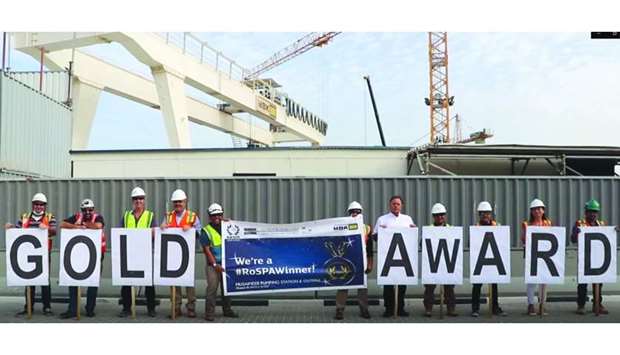The Public Works Authority’s (Ashghal) Mesaimeer Pumping Station and Outfall Project has won the prestigious “Gold Award” and “Best New Entry in the Middle East” from the Royal Society for the Prevention of Accidents (RoSPA). The awards came in recognition of Ashghal’s health and safety performance during 2019, an official statement said.
The award was received by engineer Meshaal Jarallah Abushereeda representing the Drainage Networks Projects Department at Ashghal during a virtual ceremony, held in the presence of Ashghal representatives, the project’s supervision consultant Mott MacDonald and contractor HBK-PORR JV.

On this occasion, engineer Abushereeda said that the award is a testimony to the successful implementation of Ashghal’s strategic goal to deliver sustainable infrastructure projects with outstanding health and safety performance through collaboration with all it's partners.
Ashghal started the construction works of the Mesaimeer Pump Station and outfall Tunnel project in May 2018 in order to provide a sustainable solution for the discharge of surface and stormwater in the country. The project is currently progressing as per the schedule and expected to be completed in the last quarter of 2021.
The outfall tunnel is described as the longest of its kind in the world and an important step towards providing a sustainable solution for the discharge of surface and stormwater in the country. The project will accommodate surface and stormwater volumes received from the drainage networks located in different areas in Doha. The water is treated according to the highest internationally approved specifications and then pumped 10km away from the seashore via the Mesaimeer pumping station and outfall tunnel.
The excavation of the outfall tunnel is at a depth of 15m below the seabed and about 3.7m in diameter and considered a “major construction challenge due to the variable geology that increases the exposure to unexpected conditions”.
The main tunnel at Mesaimeer will connect the existing and future drainage networks. The tunnel will "operate to drain surface water from sub-networks located in different areas, spread over an estimated 170sqkm area, and minimise rainwater catchments, especially in tunnels, as it is connected with rainwater drainage networks in 22 tunnels" (used for road traffic).
The tunnel project will also decrease the surface water level and reduce pumping costs in construction projects across the country. Besides, it will help preserve the foundations of buildings by reducing waterlogging.
The excavation is carried out using a highly specialised tunnel boring machine (TBM) that uses a technique called Earth Pressure Balance and designed to operate in a range of ground conditions in Qatar, and along with the variable geology along the tunnel.
The TBM machine incorporates advanced technologies that ensure the efficiency of the drilling process, providing the maximum safety standards for tunnel workers and operators, as well as monitoring the work execution through all it's stages.
The safety features include a “closed mode” feature, used in the case of ground deterioration to prevent water from entering the tunnel and thus protect the workers, in addition to rescue chambers that protect personnel during emergencies, fire detection and suppression, as well as emergency electricity generation systems.

Engineer Meshaal Jarallah Abushereeda with RoSPA Trophy
On this occasion, engineer Abushereeda said that the award is a testimony to the successful implementation of Ashghal’s strategic goal to deliver sustainable infrastructure projects with outstanding health and safety performance through collaboration with all it's partners.
Ashghal started the construction works of the Mesaimeer Pump Station and outfall Tunnel project in May 2018 in order to provide a sustainable solution for the discharge of surface and stormwater in the country. The project is currently progressing as per the schedule and expected to be completed in the last quarter of 2021.
The outfall tunnel is described as the longest of its kind in the world and an important step towards providing a sustainable solution for the discharge of surface and stormwater in the country. The project will accommodate surface and stormwater volumes received from the drainage networks located in different areas in Doha. The water is treated according to the highest internationally approved specifications and then pumped 10km away from the seashore via the Mesaimeer pumping station and outfall tunnel.
The excavation of the outfall tunnel is at a depth of 15m below the seabed and about 3.7m in diameter and considered a “major construction challenge due to the variable geology that increases the exposure to unexpected conditions”.
The main tunnel at Mesaimeer will connect the existing and future drainage networks. The tunnel will "operate to drain surface water from sub-networks located in different areas, spread over an estimated 170sqkm area, and minimise rainwater catchments, especially in tunnels, as it is connected with rainwater drainage networks in 22 tunnels" (used for road traffic).
The tunnel project will also decrease the surface water level and reduce pumping costs in construction projects across the country. Besides, it will help preserve the foundations of buildings by reducing waterlogging.
The excavation is carried out using a highly specialised tunnel boring machine (TBM) that uses a technique called Earth Pressure Balance and designed to operate in a range of ground conditions in Qatar, and along with the variable geology along the tunnel.
The TBM machine incorporates advanced technologies that ensure the efficiency of the drilling process, providing the maximum safety standards for tunnel workers and operators, as well as monitoring the work execution through all it's stages.
The safety features include a “closed mode” feature, used in the case of ground deterioration to prevent water from entering the tunnel and thus protect the workers, in addition to rescue chambers that protect personnel during emergencies, fire detection and suppression, as well as emergency electricity generation systems.

